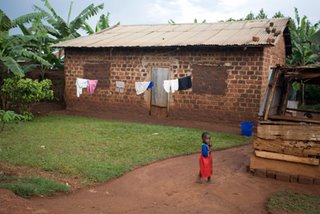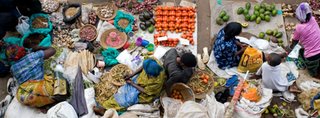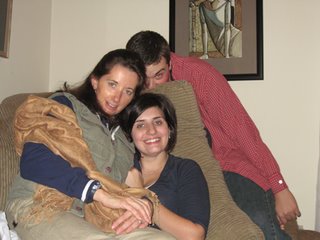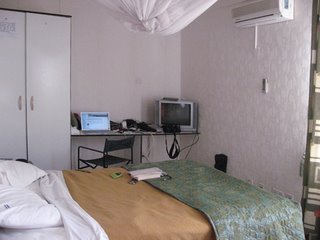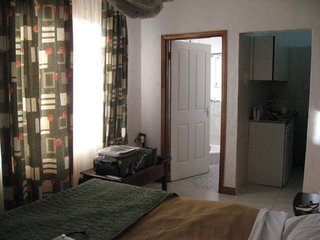I leaned into the boda-boda driver as close as I could without giving the wrong impression. It was much warmer that way, and he was certainly keeping me drier. A week ago, I never quite pictured myself careening around potholes on suburban Africa's dirt roads on the back of a mini bike, in the rain, without a jacket.
Somehow, I know that's not going to be the last not-previously-pictured situation I will find myself in.
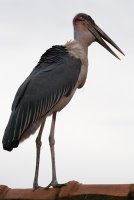
Actually, my first days here were pretty usual for a visit to a new country. Although my first morning I threw open the curtains only to be face to face with the largest bird I've seen outside of a zoo. The Marabou Stork is actually a common city dweller here. The best birder I know tells me it "enjoys cities and rubbish dumps." Two thoughts: 1. enjoys? 2. cities AND dumps?
Friday was errand day. Track down a simm card, find an ATM that actually takes my card (they all take Visa, but I've only found one so far that takes MC), meet new people, eat and nap. Dan came in that night, so I met with him and brought him up to speed on all I knew at that point. Okay, that was a brief overview, here are a few more details:
At breakfast I eavesdropped on enough conversations to finally discern who were the other workshop participants. The admin organizer of the group (Kirsten) and the head of the video group (Bill) invited me to go into the city for the simm cards and atms. Bill and I both had MC atm cards so both of us had difficulty getting funds). A second trip in the afternoon and we were set. We celebrated by having my first local meal.
Bill was here last year, so he knew some places to eat and selected a more "upscale" buffet. I'm not sure what the "upscale" part was, but it was definitely a cultural experience.
I ate a kind of banana mash (not sweet), some kind of root vegetable, a mixed rice/grain dish, a cubed beef dish, and a brownish sauce tasting like very earthy peanut butter. I by-passed on the fish (not finding much meat among the scales), the chicken, and the cabbage (for a salad-avoider like me, imagine my disappointment on the general advice of not eating anything uncooked except peeled fruits).
That night at dinner, I took it easy with a pot of tea and a semi-sweet kind of cupcake called "Queen cake."
Since Friday, culinary adventures have been less exciting. Except maybe for Saturday's skewered meat from the roadside. I think I'd try anything freshly grilled on a stick that smelled good and remotely resembled familiar meat.
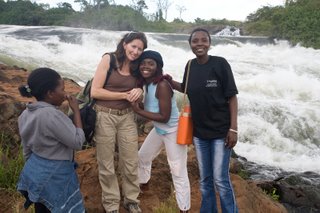
Saturday I abandoned Dan (who had to catch up with the group, settle in and combat jet lag) to go to Jinga with Bill, Kirsten, and Dennis (our local guide/driver/helper guy). Jinga is where the source of the Nile is, and another really pretty spot with amazing rapids converging from three different areas. There I met my first Africa friends (as pictured). I was crouched on the edge of the rapids, quietly taking them in with my camera when these three girls came down to "my area" laughing. One came up and took my arm. At first I thought they wanted to sell me something. But through broken english (and physical contact) it became apparent they wanted a picture with me. One girl wanted one by herself. Then the others did, too. Then there had to be group shots. Bill took some for me with my camera.
The other surreal Saturday moment was later at the Source of the Nile: Imagine pondering the serene lake and gently flowing outwaters with Aerosmith in the background. Such is sightseeing on University graduation day.
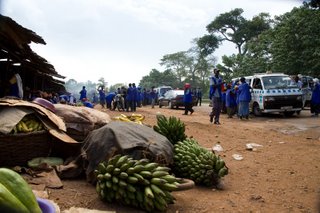
On our way back, we stopped at a roadside market so Dennis could pick up some things for his brother. We braved the crowds of hawkers to find our lunch (previously mentioned). I felt like a movie star trying to slip out of the car with the paparazzi obscured by so many varieties of stick meat, fruit, and vegetables impeding my progress. Thankfully a van pulled up and the sellers scurried off to the fresh visitors.
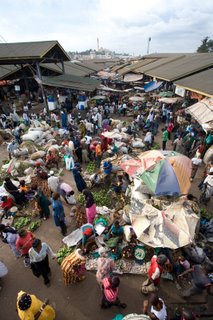
Sunday was our first day of class. We covered a lot of material, then set out to a local market to start shooting pics. OVERWHELMING. Cries of "mazungo" and "photo me" everywhere. (And I have no idea how to spell mazungo, but that's how it sounds. It means "white person"). The women were much less receptive to having their photos taken, while a lot of the men were eager to ham it up in front of the lens. Some little boys were trying to touch the lens, a woman pulled on my pant-leg wanting payment for taking another's photo... you get the idea. We've learned that some photographers have had the bad practice of paying for photos, so now many people expect payment. Which wouldn't be a bad thing, but it really inhibits getting natural images. Of course, in my opinion, sending 15 white people with cameras into an African market doesn't help things. It was really a great relief when all of us sped back to the hotel Hell's Angels-like with our herd of boda-bodas.
I think I've met my match in this workshop. We are swamped from the time we get up until 11pm or midnight. New information, sights, sounds, smells inundating us. I have so many conflicting feelings. I don't have a long-term project yet. And I may not get one. Monday was Eid (the end of Ramadan) which most everyone celebrated so we didn't get calls back from our various contacts. I will try again this morning.
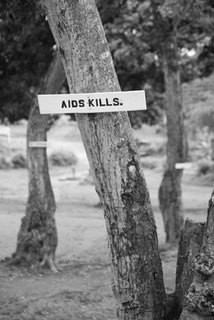
So, for our first day in the field they sent me along with two other women to take some images for Connect Africa, a 2-year-old NGO started by a woman from Boston. (Located just outside Kampala). Her goal is to help orphaned children get a decent education. They are building a small apartment complex to rent out so the NGO can become self-sustaining. Once completed and filled, they project they will be able to help about 150 students. Along with the students, they provide micro-financing to local women widowed by AIDS. So, we visited 3 schools, a woman raising pigs, and a woman raising chickens. It was tough going with 2 other photographers. First, I think it overwhelmed our subjects. Secondly, to some extent I felt I was in their way as I know I didn't get some shots I would have liked to. But, we thought they would split us up instead of taking us all to the same places together.
All told yesterday we must have walked over 5 miles. Definitely more walking than shooting. We walked in hot sun. We walked in pouring rain. At one point, we did take boda-bodas which helped (hence my opening paragraph). Boda-bodas are the preferred method of quick transport. Around Kampala they generally cost 1,000 shgs a trip, which is about sixty cents. They get their name because they used to take people from border to border during the war or something like that.
We never stopped for lunch, and made it back to Kampala just in time for our 6pm presentation from World Vision on expectations of photojournalists. With dinner still some three hours away, I hid in a corner and wolfed down a granola bar before too many students arrived. It was 10pm before I even saw my room, and that was just to drop things off, peel my muddy shoes off my feet, make a pot of tea to go and head up to the room where we review and critique each other's work.
In some sadistic, crazy way... I'm really liking this. I think. I mean, I haven't had a chance to shoot much yet. There are a lot of moral dilemmas regarding who and what we're shooting, and I'm still frustrated at not catching up with the people who have projects I'd like to follow. But the pace, the energy, and the compassion filling the country: both in the aid workers as well as the people of Uganda... it's invigorating. And even out in the field, we're not abandoned. Thatcher Cook, our workshop leader, is the most approachable instructor I've ever had. His passion for both photography and teaching is infectious, and he is the best example of balancing ethics and professionalism I've seen. He has vast experience in the field of photojournalism, telling his stories in that delicate way that's not bragging at all but instructive and useful.
Thursday all of us leave for Rakai. A remote area where we will each be assigned a family to follow for a few days. Really, all of this is preparation for that experience.
